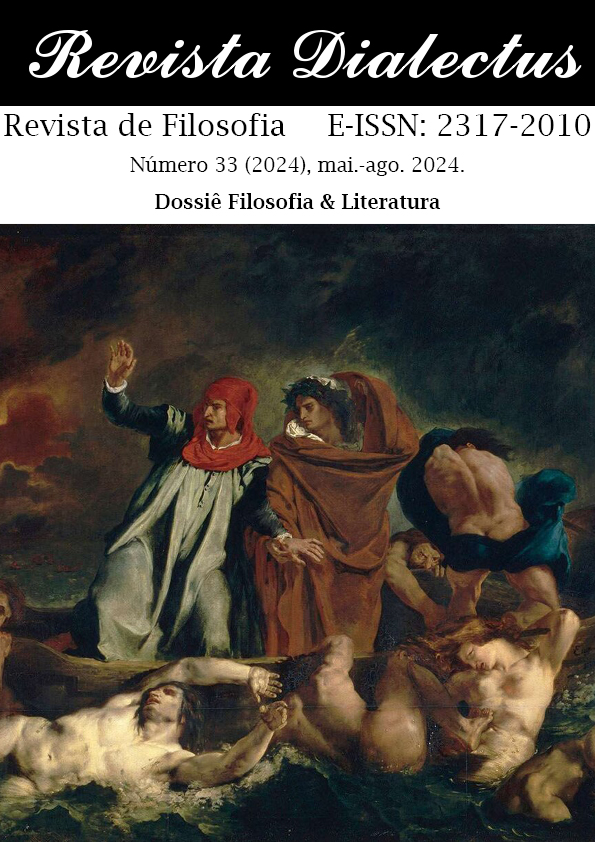UMA POSSÍVEL AFINIDADE ONTOLÓGICA DA POESIA SILÊNCIO E PALAVRA DE THIAGO DE MELLO COM O CONCEITO DE LOGOS EM HERÁCLITO DE ÉFESO
DOI:
https://doi.org/10.30611/33n33id94067Keywords:
Hominização, Pré-Socrático, Literatura, ModernismoAbstract
Este artigo aborda o ontológico na poesia de Thiago de Mello por meio do conceito de logos em Heráclito de Éfeso. Tem o propósito de aproximar a poesia à filosofia pré-socrática por entender que ambas tratam em sua imanência da hominização por meio da palavra, do discurso, do verbo; que constrói o ontológico sempre em ambiente de alteridade: mito/inconsciência, história/consciência/filosofia em diferentes epistemes: mítica, filosófica, científica, religiosa, artística. Todas fomentadas pela aisthesis, no ambiente de estranhamento que a consciência-em-si faz brotar e imperativa ao hominizado consciente dizer-se em palavras numa espécie de autolapidação. Postula-se que essa tomada de consciência transcende à metafísica, mas ela brota na querência, na physis, que edifica o somático em abstração por meio do símbolo e da alegoria, que é o charme da existência numa analogia aos fenômenos da dualidade imanente composta de imaterialidade e matéria num contínuo interpretar de si mesmo numa ontologia holística à semelhança de fractais num mosaico infinito de espécies.
References
BAUDELAIRE, C. L’homme et la mer. In. Les fleurs du mal. Paris: Éditions Garnier Frères, 1957.
BOSI, A. O ser e o tempo da poesia. São Paulo: Cultrix, 1977.
BOSI, A. História concisa da literatura brasileira. São Paulo: Cultrix, 2015.
CANDIDO, A. Literatura e sociedade. Rio de Janeiro: Ouro sobre Azul, 2006.
CASSIRER, E. Linguagem e Mito. São Paulo: Editora Perspectiva, 1992.
DETIENNE, M. Mestres da verdade na Grécia arcaica. Rio de Janeiro: Jorge Zahar Editor, 1988.
DUMONT, L. O individualismo: uma perspectiva da ideologia moderna. Rio de Janeiro: Rocco, 2000.
ELIADE, M. Mito e Realidade. São Paulo: Perspectiva, 1972.
HEIDEGGER, M. Ser e Tempo – Parte I. Petrópolis (RJ): Vozes, 2005.
HEIDEGGER, M. A origem da obra de arte. Lisboa: Edições 70, 2007.
LAÉRCIO, D. Vida y Opiniones de los Filósofos Ilustres. Madrid: Alianza Editorial, 2007.
LAKS, A. The concept of Presocratic Philosophy: Its origin, development, and significance. Princeton & Oxford: Princeton University Press, 2018.
LEBEDEV, A. V. The logos of Heraclitus: A Reconstruction of his Word and Thought (with critical edition of the fragments). Sankt Peterburg: Nauka Publishing House, 2014.
LÉVI-STRAUSS, C. Antropologia estrutural II. Rio de Janeiro: Tempo Brasileiro, 1993.
LINS, A. Silêncio, Palavra e Arte Poética. Rio de Janeiro: José Olympio, 1952.
MELLO, T. Vento Geral. Rio de Janeiro: José Olympio, 1960.
RIBEIRO, D. O povo brasileiro. São Paulo: Companhia das Letras, 1995.
SAHLINS, M. Ilhas de História. Rio de Janeiro: Zahar editores, 2003.
VERNAT, J. P. As origens do pensamento grego. Rio de Janeiro: Bertrand Brasil, 1998.
Downloads
Published
Issue
Section
License
Copyright (c) 2024 José Dalvo Santiago da Cruz

This work is licensed under a Creative Commons Attribution-NonCommercial-NoDerivatives 4.0 International License.
Authors who publish in this journal agree to the following terms:
- Authors retain the copyright and grant the journal the right of first publication, with the work simultaneously licensed under the Attribution-NonCommercial-NoDerivatives 4.0 International (CC BY-NC-ND 4.0) License, which allows the non-commercial sharing of work, without modifications and with acknowledgment of authorship and initial publication in this journal.
- Authors are authorized to take additional contracts separately, for non-exclusive distribution of the version of the work published in this journal (eg publish in institutional repository or as a book chapter), with acknowledgment of authorship and initial publication in this journal.
- Authors are allowed and encouraged to publish and distribute their work online (eg in institutional repositories or on their personal page) at any point before or during the editorial process, as this can generate productive changes as well as increase the impact and citation of published work (See The Free Access Effect).



















